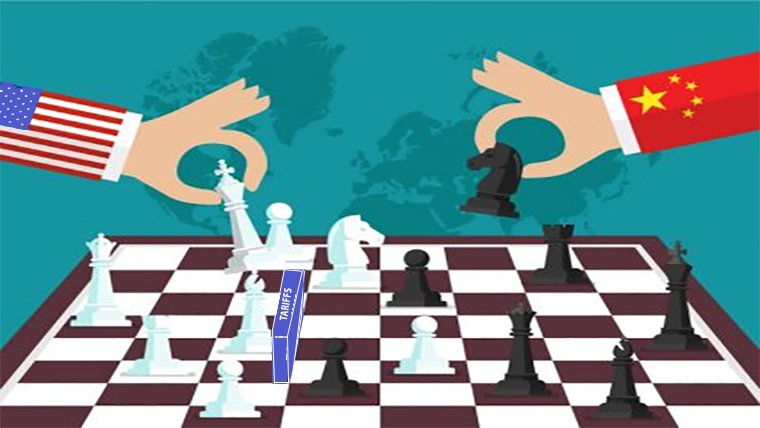
It has been puzzling to see many prominent economists decry the Trump administration’s tariffs as welfare-reducing protectionism, while approving of the Biden administration’s even more drastic steps to reshore, friend-shore, and decouple from China. In a March 2018 Chicago Booth poll of economists, 100% of respondents opposed new US tariffs; but then a largely overlapping set of respondents were sceptical of global supply chains when asked in January 2022. Only two respondents (with me being one of them) disagreed that a reliance on foreign inputs had made US industries vulnerable to disruptions.
One exception to this broader pattern is Dani Rodrik, who argued in a recent commentary that the ramifications of geopolitics are much more severe than renewed protectionism. He makes an important point; still, one must remember that protectionism was a major catalyst for today’s escalating geopolitical tensions.
The Trump tariffs both reversed a long-term trend toward trade liberalisation and imposed real costs on the US economy by raising prices for US consumers and for US firms that use imported intermediate inputs from China. But Trump’s policies had little impact on global trade overall. While trade between the United States and China declined, as expected, many other countries’ exports – both to the US and to the rest of the world – increased. Trade flows were reallocated, not reduced.
But the belief in the benefits of international trade took a hit, as more people came to regard it as a zero-sum game. The Trump administration pushed the narrative that many of America’s longstanding economic problems were due to trade with China. Inequality in the US had risen sharply, and younger generations were not doing as well as their parents. As if that was not bad enough, Chinese children did seem to be doing better than their parents. Surely, there had to be a connection between the two. If China was doing so well, America must be falling behind.
Initially, many criticized this narrative as populist pandering. But it gradually gained traction, and when COVID-19 struck, arguments in favour of protectionism and against China went mainstream. Suddenly, everyone agreed that the pandemic-related supply-chain problems were a result of international trade. Never mind that many of the bottlenecks originated domestically and had nothing to do with global supply chains; or that without imported masks from China, shortages of personal protective equipment would have been worse; or that, despite COVID-19 being the biggest global shock since World War II, the world economy proved quite resilient. The narrative was shifting toward blaming international trade, and particularly trade with China, for every problem in the modern economy.
Then came Russia’s full-scale invasion of Ukraine – the final straw. Though the aggressor was Russia, not China, it was now all too easy to imagine what would happen to the global economy if China invaded Taiwan. Concerns about geopolitical risks and national security came to the fore, lending momentum to calls not for just protectionism but for a broader economic decoupling from China.
Again, it is easy to blame the Russian invasion for ushering in a new cold war. But would we be where we are without the resurgent protectionism and calls for supply-chain resilience in recent years? By undermining the belief in international cooperation and pushing the narrative of trade as a zero-sum game, those policies and strategic objectives created some of the preconditions for today’s economic warfare.
Whereas trade was presented as a zero-sum game in 2015-16, when Trump was elected, now national welfare is being framed in these terms. The issue is no longer just about tariffs and trade. Those are relevant only to the extent that they can be used to stop China from developing its technological capabilities. The primary concerns now, we are told, are “de-risking” and national security, rather than America’s desire to maintain economic dominance.
But such justifications are problematic. Consider de-risking. It sounds prudent, but is it really about China? Global production of the most advanced semiconductors is concentrated within a single Taiwanese company (TSMC), which certainly does imply a high risk of disruption should the company suffer some shock. But such a shock need not come from a Chinese invasion; it could also take the form of a health crisis, a natural disaster, or even personnel issues. The root problem is not China, but high market concentration. The same kind of risk would still be salient if the company was based in the US.
While worrying about optimal diversification and de-risking makes sense, casting everything in geopolitical terms does not. When Trump recently vowed to impose massive new tariffs if re-elected, the international community rushed to condemn such policies. But tariffs matter less now, because the damage has already been done.
We live in a new era. As I noted in a previous commentary, drawing on work by economic historians, there are eerie parallels between the period leading up to World War II and recent developments in US trade and foreign policy. Protectionism is a problem, not just because of its impact on trade, but also because of its impact on international relations and geopolitics.
Pinelopi Koujianou Goldberg, a former World Bank Group chief economist and editor-in-chief of the American Economic Review, is Professor of Economics at Yale University. Copyright: Project Syndicate, 2023, published here with permission.
5 Comments
>Globalist banker economist crying about tariffs and wanting to return to 1990.
We need to reindustrialise for the new cold war. Old economists and the old economics needs to be ignored.
And she has it exactly a about f.
The human species is running up against resource limits, and is overshot. That was always going to drive protectionism; couldn't not.
The high-water-mark was Mike Moore and Gatt - and that was a looooooooooooooong time ago...
And she doesn't provide any arguments, other than that there were domestic bottlenecks during Covid-19 as well as international bottlenecks. Cool story.
China is not the problem here. Mr Xi & his CCP comrades are the real villains. It's a similar story in Russia. Take away the ultra-nationalists in charge & you have a chance to create something different. Better even.
The USA needs China. The rise of China over the last 3 decades has benefited America [the country] greatly. Not so much some of the American people however, as the cost of their labour was far too high to compete globally. Europe needs Russia. They are a natural fit, which is the sad part about the situation in the Ukraine. Done right [and I realise that's a big job] would be of huge benefit to both blocks. The Russians identify with Europe way more than they do with China, their other great neighbour to their south-east.
It all comes down to people in the end. Is there anyone with the skills & diplomacy to build these bridges? Is there someone out there with the desire to mend these relationships? Certainly not on the Russian or Chinese sides at present. But it's up to us to drive this. Indeed, a trusted third party negotiator is probably the missing ingredient right now. I wonder if John Key & Helen Clark are up for it?
Finally see some vision here

We welcome your comments below. If you are not already registered, please register to comment
Remember we welcome robust, respectful and insightful debate. We don't welcome abusive or defamatory comments and will de-register those repeatedly making such comments. Our current comment policy is here.